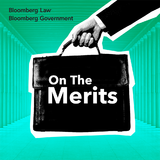Justices Likely to Ease Appellate Rules for Pro Se Litigants
The US Supreme Court appeared likely to relax requirements for litigants seeking an appeal after missing a formal deadline to do so, particularly for those representing themselves.

Big Law firms rushing to expand their reach in Saudi Arabia are seeing more competition, even as slumping oil prices float a gloomy cloud over deals work across the Middle East.
Thousands of students a year from top US law schools flock to white-shoe law firms, which dangle starting pay of roughly $245,000 in exchange for long hours and intense demands from corporate clients.
Two prominent conservative judges weighed in with diverging perspectives about how much power the courts should have over the executive on the same day.
Kirkland & Ellis LLP, four partners, and a female former attorney agreed to dismiss her lawsuit alleging sex bias, retaliation, defamation, and other claims.

Investment manager Gramercy reported a sizable return to investors in a mass tort law firm’s loan refinancing, reflecting a bright spot amid the recent slump in mass tort proceeds.



The US Supreme Court appeared likely to relax requirements for litigants seeking an appeal after missing a formal deadline to do so, particularly for those representing themselves.
Reema Shah joined O’Melveny & Myers as a partner in its securities litigation and financial services practice group and artificial intelligence industry group in New York, the firm announced Monday.
Timothy Longman joined BakerHostetler as a partner in its litigation practice group and antitrust and competition team in Washington, the firm announced Monday.
Markenzy Lapointe joined Pillsbury as a partner in its corporate investigations and white collar defense practice in Miami, the firm announced Monday.
Justin Hamill joined Silver Lake as managing director and chief legal officer, the firm announced April 17.
Lawrence Cameron joined Troutman Pepper Locke as a partner in its white collar litigation and investigations practice in Charlotte, N.C., the firm announced Monday.
Feb 25, 2025, 3:39 PM UTC
Feb 21, 2023, 3:55 PM UTC
Nov 15, 2022, 2:25 PM UTC
Oct 20, 2021, 4:15 PM UTC





Kirkland & Ellis retained its crown as Big Law’s top mergers and acquisitions adviser in 2024, nabbing several of the largest transactions of the year.
Kirkland & Ellis retained its crown as Big Law’s top mergers and acquisitions adviser in 2024, nabbing several of the largest transactions of the year.
On May 28, 2012, Dewey & LeBoeuf, the product of a merger between two storied New York law firms, filed for bankruptcy. For the first time, Dewey's former chair Steven Davis opens up about the years, months, and weeks leading to his firm's collapse, the decisions he made and, looking back, whether he would have done anything differently.




Coinbase sold unregistered securities to Oregon residents without properly screening the risky investments to protect consumers, the state’s attorney general said in a lawsuit against the company.
Davis Polk partner Joseph Hall says policymakers are asking the wrong questions when they try to determine how cryptocurrency should be regulated.
For about a week, Bitcoin mining firms in Southeast Asia faced an all-consuming deadline: midnight, April 9.
The Slovenian finance ministry is seeking feedback on a proposal to impose a 25% tax on personal profits from the disposal of crypto assets.
Hidden Road received a license to operate as a broker-dealer, part of the firm’s expansion of its prime-brokerage business to reach more institutional investors.
The powertrain venture majority-owned by China’s
Get the latest legal, regulatory, and enforcement news and analysis, as well as in-depth business and industry covering in the following areas: